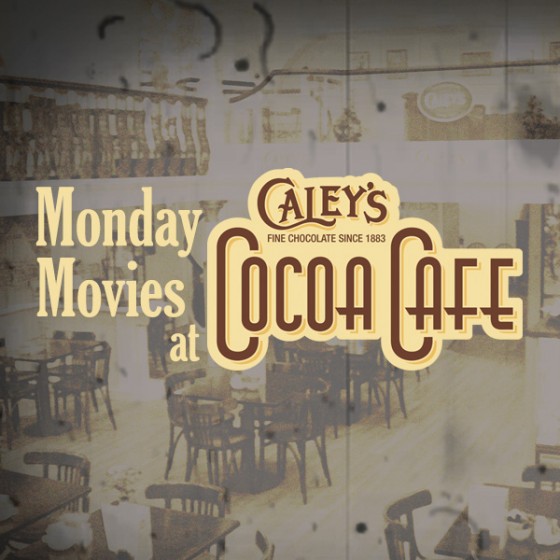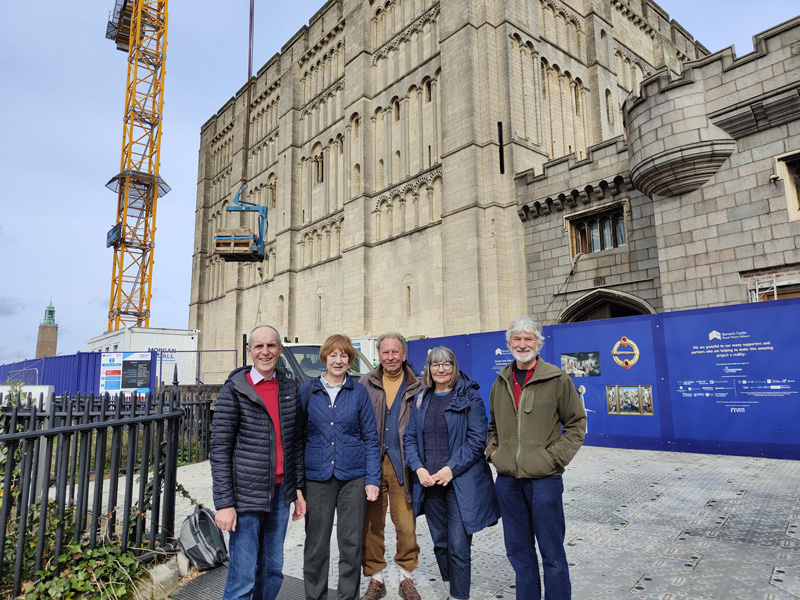>February Events / Events in Norfolk and Suffolk / Food and Drink / Then & Now / Tourist Attractions Norfolk and Suffolk January 29, 2015
Monday Movies returns to Caley’s Cocoa Café next week, giving customers the opportunity to enjoy archive film alongside their hot chocolate as part of the monthly screening event.
Caley’s Cocoa Café, based in The Guildhall, was last year taken on by Norwich Heritage Economic and Regeneration Trust (HEART), helping to keep alive another well-loved Norwich heritage brand following the Trust’s acquisition of Colman’s Mustard Shop & Museum in 2009.
Each first Monday of the month, Caley’s Cocoa Café will screen a montage of silent archive films, including captivating locally shot footage from Norfolk and around East Anglia, as well as from Normandy, France. February’s screening features footage from around Norwich, King’s Lynn, Diss and Cromer. Including films from the 1900s to the 1960s, witness colourful carnivals and local characters, as well as stunning clips of Royal visits.
The archive film compilations are a worthwhile legacy from HEART’s successful Interreg IVA funded Digital Heritage Project, which was delivered as a partnership with Rouen based film agency Pôle Image and UEA’s East Anglian Film Archive.
The screening events are free and take place on the first Monday of every month, from 10am to 4pm.
For more information, see www.heritagecity.org or Caley’s Cocoa Café on Facebook.
–
About Caley’s Cocoa Café
Caley’s Cocoa Café operates as a bastion for the brand that once operated in the city centre, where Chapelfield shopping centre is now situated. The cafe is now managed and developed by Norwich HEART, in conjunction with the Guildhall. The café stocks a range of chocolates, and a specialist menu that incorporates Caley’s products. The café is surrounded by memorabilia from the brand’s historic past, and evokes Norwich’s unique industrial heritage.
Caley’s Cocoa Café is open Monday – Saturday, 8am-4.30pm, and Sunday 10am-4pm. www.facebook.com/CaleysCocoaCafe
–
About Caley’s history
The café, originally a subsidiary of Caley’s, is inspired by the historic Norwich brand, which was established in 1856, and achieved fame nationally for its chocolates. Caley’s became particularly renowned for their Marching Chocolate, distributed to soldiers during the First World War. From 1914-1918, thousands of bars of Marching Chocolate were sent to the front.
At the end of the First World War, the business was purchased by The African and Eastern Trade Corporation, who, in 1932, sold the firm to John Mackintosh & Sons Limited of Halifax for £138,000. Under Mackintosh & Sons, Caley’s manufactured the first pack of Rolos in 1937. Rolos proved such a success that the main plant in Norwich produced two tons an hour. During the 1950s, a succession of new and iconic products followed from the Norwich factory; Week-End and Munchies were introduced in 1957, Caramac in 1959, Good News Assortment began in production at Norwich in 1960.
By 1988 on the Chapel Field site covered approximately seven acres and, under Rowntree-Mackintosh, employed about 1,100 people in Norwich. The factory produced over 40 million chocolate eggs each year in preparation for Easter. It was in this year that Rowntree-Mackintosh was taken over by Nestlé, and within eight years the Norwich factory had closed, as production was centralised in York.
–
About Norwich HEART
Norwich Heritage Economic and Regeneration Trust (HEART) is a private, charitable trust set up to act as an umbrella organisation for all of the heritage on offer in Norwich. We strategically plan, regenerate, manage and promote Norwich’s heritage and act as a best practice model internationally for developing heritage as a social and economic regeneration vehicle. HEART manages The Guildhall, the largest and most elaborate medieval, provincial city hall in the country; organises and promotes Heritage Open Days in Norwich and Norfolk and ran the EU award-winning SHAPING 24 project.
HEART receives support from bodies including the University of East Anglia and Norwich City Council and has received project funding from a variety of sources including European Union, HM Treasury, the East of England Development Agency and Norfolk County Council.
—
advert










